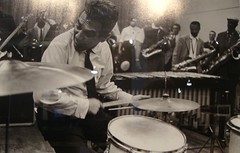Jazz is a music genre that originated at the beginning of the 20th century in African American communities in the Southern United States from a confluence of African and European music traditions, says Wikipedia.
From its early development until the present, jazz has incorporated music from 19th and 20th century American popular music.[1] Its West African pedigree is evident in its use of blue notes, improvisation, polyrhythms, syncopation, and the swung note.[2]
The word "jazz" (in early years also spelled "jass") began as a West Coast slang term and was first used to refer to music in Chicago in about 1915.
From its beginnings in the early 20th century jazz has spawned a variety of subgenres:
- New Orleans Dixieland dating from the early 1910s,
- big band-style swing from the 1930s and 1940s,
- bebop from the mid-1940s,
- Latin jazz fusions such as Afro-Cuban and Brazilian jazz,
- free jazz from the 1950s and 1960s,
- jazz fusion from the 1970s,
- acid jazz from the 1980s (which added funk and hip-hop influences), and
- Smooth and nujazz in the 1990s.
While jazz may be difficult to define, improvisation is clearly one of its key elements. Early blues was commonly structured around a repetitive call-and-response pattern, a common element in the African American oral tradition. A form of folk music which rose in part from work songs and field hollers of rural Blacks, early blues was also highly improvisational. These features are fundamental to the nature of jazz.
In jazz the skilled performer will interpret a tune in very individual ways, never playing the same composition exactly the same way twice. Depending upon the performer's mood and personal experience, interactions with fellow musicians, or even members of the audience, a jazz musician/performer may alter melodies, harmonies or time signature at will.
Jazz music has always had a "tension between jazz as a commercial music and an art form".[4]
Predecessors of jazz:
Ragtime: The classically trained pianist Scott Joplin in 1899 had an international hit with "Maple Leaf Rag". He wrote numerous popular rags, including, "The Entertainer", combining syncopation, banjo figurations and sometimes call-and-response, which led to the ragtime idiom being taken up by classical composers including Claude Debussy and Igor Stravinsky.
Blues music was undocumented in the early years. The first popularizer of a type of blues was W. C. Handy, whose "Memphis Blues" of 1912 and "St. Louis Blues" of 1914 both became jazz standards.[18] Additional influences came from spirituals and even vaudeville.
Tuesday, September 7, 2010
Subscribe to:
Post Comments (Atom)





No comments:
Post a Comment